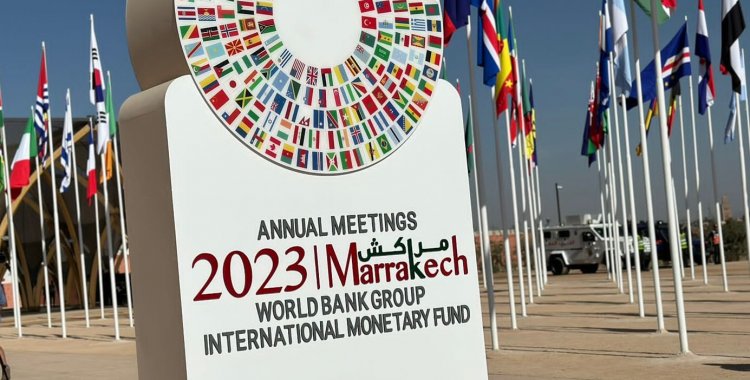Lemaire stated, in an interview with Lusa on the sidelines of the IMF and World Bank Annual Meetings, taking place this week in Marrakesh, that "African governments must also have a response to the slowdown in foreign investment, implementing policies that attract more private financing, to combat the very high risk perception, focusing on reforms that improve the business climate and counteract the high macroeconomic risk".
Coinciding with the release, this Tuesday, by the IMF of the growth forecast for sub-Saharan Africa, revised downwards to 3.3 percent this year and 4 percent next, compared to 3.6 percent and 4.2 percent, respectively, predicted in April, Lemaire stressed in the interview that "what the IMF is doing is insisting on the issue of the financing crisis, which includes the climate dimension" and which is exacerbated by the increase in financing needs of African countries just to combat the effects of climate change.
"The 100 billion dollars per year [agreed by the countries at COP15, in Copenhagen] are not just for Africa, they are for all developing countries" said the economist, one of the authors of the report on the Regional Economic Perspectives of Africa sub-Saharan region, which will be released on Friday.
In 2020, the last year for which data is available, these countries as a whole received "83 billion dollars and, of this amount, a quarter went to sub-Saharan Africa", he highlighted.
This value, he admitted, "is much lower than the climate financing needs, with several studies showing that the continent needs 50 billion dollars per year until 2050 for adaptation, and an even greater amount for the mitigation" of climate change.
Asked how countries can finance economic development when their own financing is lower than before, Lamaire highlighted that this financing crisis affects not only the short term, but also the long term, and pointed out three areas that can fill this deficit.
"First, a greater use of the continent's internal resources, as tax revenues from low-income countries represent only 13 percent of GDP, when this average is 19 percent in developing countries and 27 percent in advanced economies ; then, use internal savings that are concentrated in the informal sector, and hence the importance of financial inclusion and the development of the financial sector, to allow internal savings to finance development", he argued.
Finally, he added, governments must also "improve the business environment, improve Education and governance, which will attract Foreign Direct Investment, which is often directed towards natural resources and extractive industries".
It is important, he concluded, that this public financing is countercyclical, that is, it is greater when the economy slows down, as the private sector "usually goes in the same direction as economic cycles".
Asked about the IMF's prospects for sub-Saharan Africa, the economist from the African department said that "2023 is going to be a very difficult year for the region's economies", but highlighted that the estimate is that there will be a recovery in 2024.
"Four-fifths of the region's economies will recover in 2024; external conditions are improving, global inflation has slowed significantly, interest rates in advanced economies will stop increasing and we see a decline in global food prices, which is very positive for the continent's economies", he stated.
Among the positive aspects, Lamaire also lists the fact that public debt has stabilized at 60 percent, despite still being high, and that the average budget deficit is decreasing, as is inflation.
"These are positive aspects, but we cannot be totally optimistic, there are still problems to resolve", he admitted, pointing out the contraction in financing, the high financing needs, the drop in investment flows in the region, food inflation and the decline in indicators of human development, "which will have long-term repercussions for the prosperity of the region, especially for less diversified economies".







